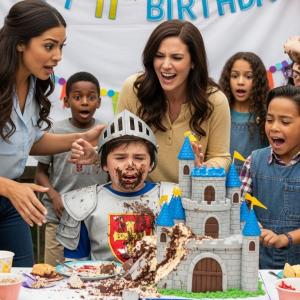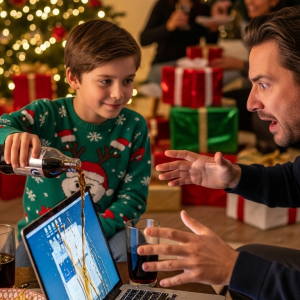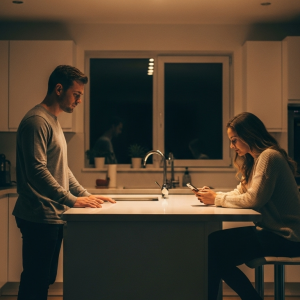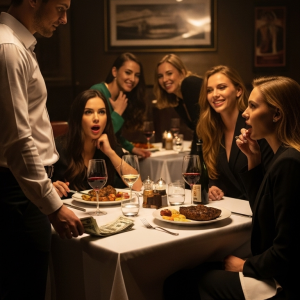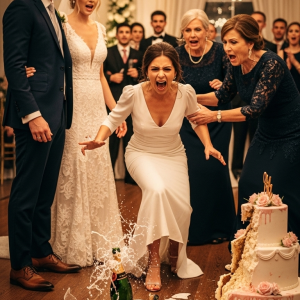My family thought it would be funny to leave me stranded in another state. “Let’s see if he can make it back,” they laughed as they drove away. I never came back. Fifteen years later, they found me.
That summer I turned 22 was supposed to be like any other: working at my dad’s hardware store, living at home because college wasn’t “practical,” and being the eternal punching bag for my golden-child brother, Allan. So when my dad, Banks, announced a family road trip to my uncle’s wedding in Colorado, I should have known something was up.
Three days into that nightmare, I was already regretting not faking an illness to stay home. Banks and Allan had been taking turns with their favorite game: making my life a living misery. My mom, Irene, would occasionally murmur, “That’s enough,” in that weak voice of hers, but we all knew it was just for show.
That morning, we stopped at a desolate rest area in the middle of nowhere. Just fields, distant mountains, and a sad little bathroom building. I’d been sleeping in the back of our Suburban. I remember exactly what I was wearing: a faded Metallica t-shirt and jeans with a hole in one knee. I didn’t take my phone or wallet. Why would I?
Ten minutes. That’s how long I was in the bathroom. When I walked out, squinting in the Colorado sunshine, the parking spot was empty. Our dark green Suburban was gone.
At first, I thought it was a prank. I walked around the entire rest area. Nothing. I waited an hour, sitting on the curb, telling myself they were just trying to scare me. People came and went, a few giving me weird looks. After hour two, a cold feeling settled in my gut. They weren’t coming back.
My first instinct was to borrow a phone, call them, and beg them to come get me. But as I was about to approach a young mother, a lifetime of memories flashed through my head. Every humiliation, every cruel joke. I could almost hear them:
Allan’s voice: “Dude, I bet he’s crying right now.”
My dad’s: “He’ll figure it out. If he’s not as stupid as he looks.”
My mom’s weak protest that changed nothing.
So, I made a decision. I approached that mother and asked to use her phone. But I didn’t call my family. I called information and got the number for the nearest shelter in Grand Junction, about 40 miles away. Then, I told her my family had an emergency and had to leave, but they were sending someone for me later. She hesitated, but I must have looked harmless enough, because she agreed to give me a ride.
That first night at the shelter was a reality check. I had nothing but the clothes on my back. The shelter manager, Dave, let me use their computer. I thought about finding my way to the wedding, but then I stared at the screen and thought, Why? Why chase after people who literally abandoned me for a laugh?
Instead, I created a new email account. I looked up resources for people needing an emergency ID. I Googled jobs that paid cash. I made a plan.
Two days later, I was washing dishes at a little diner called Sunny’s. The owner, Geraldine, was a woman in her sixties with purple-streaked hair and more tattoos than you’d expect. I told her my wallet was stolen but I needed work. She sized me up and said, “Dishwasher quit yesterday. You steal from me, you’re dead. Start now.”
Rock bottom is a solid place to build from. For a week, I worked doubles and slept at the shelter. With the first cash I earned, I got a cheap pay-as-you-go phone. Seven days after they abandoned me, my phone rang. Unknown number. It was my mother.
Her voice was shaking. Where was I? Was I okay? It was just supposed to be a joke. They’d waited down the road. They’d come back. In the background, I could hear my dad telling her to tell me to stop being dramatic. I heard Allan laughing.
That cold feeling in my gut was gone. Now, there was just clarity.
“You wanted to see if I could make it on my own,” I said, my voice steadier than it had ever been. “So, watch me.”
I hung up. I blocked their numbers. The next day, I changed my number completely.
Fifteen years. That’s a long time to build a life from scratch.
That first year, I worked my way up from dishwasher to prep cook at Sunny’s. Geraldine taught me how to properly chop vegetables without losing a finger. I got my own studio apartment above a laundromat. It was tiny and always smelled like fabric softener, but it was mine.
I’d check my old email sometimes. Messages from Mom: Please come home, we’re sorry. From Dad: This childish stunt needs to end now. From Allan: Dude, it was just a joke. I never responded. Once you’ve tasted freedom, there’s no going back to the cage.
Holidays were the worst. But every morning, I’d wake up in my little apartment, go to my job where nobody called me worthless, and build my life, one brick at a time. Three months in, I deleted that old email account for good. That night, Geraldine taught me how to make her famous apple pie. She said I had good hands for pastry. It was the first genuine compliment I could remember getting in years.
Five years after being abandoned, I saw Allan’s face on my Facebook feed. He’d gotten a DUI and wrapped his car around a telephone pole. The paper used his smug high school football photo above his bloated mugshot. Karma never forgets an address.
By then, my life looked different. I was the assistant manager at Sunny’s. I was taking online business classes. I’d made two friends: my neighbor Doug, and Geraldine.
That changed when Kendra started coming into Sunny’s every Tuesday and Thursday. She was a med school student who would get so lost in her textbooks she’d forget to eat her omelet. For four months, I just refilled her coffee. Then one day, she actually looked up and saw me. We started with a stupid joke about my name tag being spelled wrong. Six months later, we had our first real date. A year after that, we moved in together.
Meanwhile, I kept tabs on my family through fake accounts. Dad’s hardware store was failing. Mom’s social media became a weird shrine to a family that never existed, full of throwback pictures and posts about “missing her boys.” Allan bounced from job to job.
Three years in, Geraldine asked me to run a second Sunny’s location. I almost said no—Banks’s voice was still in my head, telling me I was worthless—but Kendra, half-asleep beside me, mumbled that I’d be an idiot not to.
Sunny’s East opened six months later. It was my menu, my vibe. I worked 90-hour weeks. We fought. We struggled. But it worked. We made it.
Four years after being abandoned, I made enough to help Kendra with her monstrous med school loans. She cried when I showed her the payment confirmation—real, snotty, hiccuping tears. I’d never felt more like a real person.
Then my grandmother died. I found out on Facebook. She was the only one in the family who ever stood up for me. I thought about going to the funeral, but I didn’t. I sent flowers, signing the card with just my name: Salvador. The social media explosion was immediate. A week later, my Uncle Rick found an old email address and reached out. I blocked him.
Fifteen years to the day after being abandoned, I married Kendra. A small ceremony in a state park. Her large, loud family adopted me instantly. A week after the wedding, I saw a post from Banks on a community page, looking for me. “Family emergency,” it said. Their hardware store had closed. Their house was in foreclosure. They weren’t looking for me because they missed me. They were looking for me because they needed something.
And for the first time in fifteen years, I smiled when I thought about them. Not because I was happy about their misfortune, but because I realized I didn’t care anymore.
It started with a LinkedIn notification. Fifteen years of silence, broken by my brother, Allan, viewing my profile 27 times in one day.
My life was settled. Kendra was a doctor. We had two kids, Ellie, 7, and Marcus, 4. We had a modest four-bedroom house with a yard. Sunny’s had expanded to three locations. I had made peace with my past, or so I thought. The notification rattled me.
Three days later, they were standing in my restaurant.
Banks looked older, grayer, somehow shrunken. Irene’s face was pinched, her hair dyed an unnatural shade of brown. Allan looked just like Banks had at 40, same stance, same way of taking up space. There was a young woman with them, his second wife, Poppy.
The lunch rush noise faded away. Banks said my name like a question. I nodded, my voice gone on vacation. I had imagined this moment a thousand times. Reality is always messier. I gestured to an empty table and waited.
They had found me through a magazine article. Rocky Mountain Rising: 10 Local Success Stories. My mom had kept count of the 107 missed calls they’d made to my old number before it was disconnected. She mentioned this like it was supposed to mean something.
They talked over each other, spinning their version of reality where they weren’t the villains. Banks kept eyeing the restaurant, mentally calculating its worth. Finally, when they ran out of steam, I asked the only question that mattered: “Why now?”
The real story came out. Banks had heart problems, no insurance. Their second house was being foreclosed on. Allan’s crypto venture had failed spectacularly. Mom needed knee surgery she couldn’t afford. They weren’t here for reconciliation. They were here for money.
I should have been angry. Instead, I felt pity. These giants who had once controlled my world were just flawed, broken people.
I invited them to dinner at my house that night.
That afternoon was surreal. I picked Ellie up from dance class, helped Marcus with his show-and-tell, all while texting Kendra updates. She offered to take the kids to her sister’s. I said no. I wanted my family to meet my family.
Introductions were awkward. Banks kept calling Kendra “Karen.” Irene couldn’t stop crying whenever she looked at my children. Allan kept dropping hints about “family helping family.”
After Kendra took the kids upstairs, Banks started his pitch. How family sticks together, how they just needed a little help—$200,000, just a loan, of course.
I let him finish. Then I asked him if he remembered what he said on my 18th birthday. He looked blank. I reminded him: “At least you can’t disappoint me anymore once you’re not legally my problem.”
I asked Mom if she remembered doing nothing when Banks threw my community college acceptance letter in the trash. I asked Allan if he remembered telling my first girlfriend that I was “probably gay anyway.”
They squirmed. Banks started to get that dangerous edge in his voice, but I wasn’t that 22-year-old anymore.
I went to my office and came back with an envelope. Inside was a check for $73.50.
Banks looked at it, confused. “What is this supposed to be?”
“In 2010,” I told him, “that was the exact cost of a Greyhound ticket from Grand Junction to our hometown. The exact amount it would have taken for me to make it back home from where you abandoned me.”
The silence was absolute. Then the shouting started. I was ungrateful, selfish, a disappointment—the greatest hits album of my childhood. I didn’t argue. I just stood up and told them it was time to leave.
When they finally left, Banks crumpling the check and throwing it on our front step, I closed the door and leaned against it, my legs suddenly shaky. Kendra came downstairs and we cleaned up in silence.
I’ve never seen or heard from them again. The chapter is closed. The best revenge isn’t something you do; it’s something you live. Every happy moment with my kids, every quiet Sunday morning with nothing to fear—every ordinary day in a life built on my terms. I never made it back home. I did something better. I built one.
When the door closed behind them, I stood there for a long time, listening to the sound of their car fading down the street. I thought I’d feel triumphant. Instead, I just felt… emptied out.
Kendra came back into the living room, drying her hands on a dish towel. “You okay?” she asked quietly.
I nodded, though it wasn’t true. “Yeah. Just… fifteen years of imagining what I’d say, and then when it happens, all I wanted was for them to leave.”
She studied my face for a moment, then said, “Good. That means you’ve moved on more than you thought.”
We sat on the couch. The check for $73.50 still lay on the step outside, damp from the evening air. Through the window, I could see it curling in on itself.
The next morning, Ellie asked, “Who were those people last night?”
“My family,” I said, and the words felt strange. “The family I grew up with.”
“Why don’t we see them?” she asked.
I thought about how much to say. “Because sometimes, even if someone is family, they’re not safe to be around.”
“Like when we don’t pet strange dogs?”
I smiled. “Exactly like that.”
Marcus was busy with his cereal, but he piped up, “Were they mean?”
“They weren’t nice,” I said carefully. “Not to me.”
Ellie frowned, then nodded like she was filing the information away for later. Kendra met my eyes across the table, and I could see the unspoken agreement—we’d tell them the full story one day, when they were ready.
Two weeks later, a letter arrived. Handwritten, from my mother. The envelope was thin and smelled faintly of her perfume, the same one she used to wear when I was a kid.
Sal, I’m sorry for everything. I know words can’t undo the past. I don’t expect you to forgive us, but I hope one day you might understand. We were wrong. We thought we were teaching you to be strong, but all we did was push you away. Please don’t let this be the last time we speak.
I read it twice. Then I set it on the counter and didn’t touch it again.
That night, Kendra asked if I’d answer.
“No,” I said. “I don’t think she wants closure. I think she wants absolution. And I can’t give that to her.”
About a month later, I was closing up Sunny’s when a man walked in. He was about my age, wiry, with restless eyes. He looked around like he was checking for someone before coming to the counter.
“You Salvador?”
I nodded cautiously. “Yeah. Who’s asking?”
“I’m Allan’s business partner. Former business partner. He owes me a lot of money. He said you might cover it for him.”
I almost laughed, but there was nothing funny about the way this guy’s hands twitched. “You drove here to tell me that?”
He shrugged. “I’m not here to start trouble. I just want my money. But if you’re not gonna pay, I guess I’ll have to find him some other way.”
I leaned on the counter. “You should know something about Allan. If he told you I’d bail him out, he was lying. And if you lent him money, you might as well write it off as a life lesson.”
The man’s eyes narrowed. “You’re not gonna help family?”
“Not that kind of family,” I said.
He left without another word. I watched him drive away and thought about how Allan had spent his whole life convinced the world would clean up his messes. Now he was finding out otherwise.
That night, I dreamed about the rest stop. Only in the dream, it wasn’t sunny—it was snowing, and I could see my breath in the air. The Suburban’s taillights were just dots on the white horizon. I woke up with my heart racing, Kendra’s hand resting on my chest.
“You were talking in your sleep,” she murmured.
“What did I say?”
“You said, ‘I’m not going back.’”
I lay there for a long time, staring at the ceiling, realizing that even now, part of me still stood in that parking lot, waiting for a car that was never coming back.
Two months passed before I heard from them again. This time it was Allan himself, calling from an unknown number. I didn’t answer, but he left a voicemail.
“Sal, listen. I messed up. I know we weren’t great to you, but we’re still brothers. We can fix this. I’m in some deep trouble, man. If you help me, I’ll make it right. I swear.”
I didn’t delete it right away. I played it once more, just to hear how small his voice sounded. Then I erased it.
One evening, after the dinner rush, Geraldine stopped by Sunny’s East. She’d retired two years earlier but still checked in sometimes. She looked around the place and smiled. “You’ve done good, kid.”
“Thanks,” I said. “Means a lot, coming from you.”
She pulled up a chair. “Word is your family’s sniffing around.”
I nodded. “They found me a couple months ago. Wanted money.”
Her eyebrows went up. “And you told them—?”
“That the ticket home cost seventy-three dollars and fifty cents.”
Geraldine laughed, loud and sharp. “I like that. You gave them exactly what they asked for, just fifteen years too late.”
I grinned. “Yeah. And I’m done giving them anything else.”
Spring came, and with it Ellie’s first ballet recital. As I sat in the front row, watching her spin awkwardly in her pink tutu, I thought about how my parents never came to anything I did. Not one school play, not one soccer game.
When the recital ended, Ellie ran into my arms. “Did I do good?” she asked, breathless.
“You were amazing,” I told her. And I meant it, every syllable.
Kendra slipped her arm through mine. “You’re changing the pattern,” she whispered.
And I realized she was right. Whatever my parents had done, whatever they’d failed to do, it ended with me.
The last time I heard from them was almost a year later. A short, curt email from my mother: We won’t bother you again. I hope your life is everything you wanted.
I stared at it for a long time. Then I typed a single sentence in reply: It’s better than I ever imagined.
And it was true.
Because the best revenge wasn’t the check or the refusal to help. It wasn’t showing them how well I’d done without them. It was standing in my own kitchen on a Sunday morning, with Kendra flipping pancakes, Ellie and Marcus laughing over some private sibling joke, and realizing I’d built a home they could never touch.
That’s the part they’ll never understand: I didn’t come back because there was nothing to come back to. I didn’t need them to see me succeed. I just needed to live a life where their absence was the quietest part of the story.
